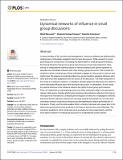| dc.contributor.author | Moussaïd, Mehdi | |
| dc.contributor.author | Noriega Campero, Alejandro | |
| dc.contributor.author | Almaatouq, Abdullah | |
| dc.date.accessioned | 2021-10-27T20:23:47Z | |
| dc.date.available | 2021-10-27T20:23:47Z | |
| dc.date.issued | 2018 | |
| dc.identifier.uri | https://hdl.handle.net/1721.1/135514 | |
| dc.description.abstract | In many domains of life, business and management, numerous problems are addressed by small groups of individuals engaged in face-to-face discussions. While research in social psychology has a long history of studying the determinants of small group performances, the internal dynamics that govern a group discussion are not yet well understood. Here, we rely on computational methods based on network analyses and opinion dynamics to describe how individuals influence each other during a group discussion. We consider the situation in which a small group of three individuals engages in a discussion to solve an estimation task. We propose a model describing how group members gradually influence each other and revise their judgments over the course of the discussion. The main component of the model is an influence network—a weighted, directed graph that determines the extent to which individuals influence each other during the discussion. In simulations, we first study the optimal structure of the influence network that yields the best group performances. Then, we implement a social learning process by which individuals adapt to the past performance of their peers, thereby affecting the structure of the influence network in the long run. We explore the mechanisms underlying the emergence of efficient or maladaptive networks and show that the influence network can converge towards the optimal one, but only when individuals exhibit a social discounting bias by downgrading the relative performances of their peers. Finally, we find a late-speaker effect, whereby individuals who speak later in the discussion are perceived more positively in the long run and are thus more influential. The numerous predictions of the model can serve as a basis for future experiments, and this work opens research on small group discussion to computational social sciences. | |
| dc.language.iso | en | |
| dc.publisher | Public Library of Science (PLoS) | |
| dc.relation.isversionof | 10.1371/JOURNAL.PONE.0190541 | |
| dc.rights | Creative Commons Attribution 4.0 International license | |
| dc.rights.uri | https://creativecommons.org/licenses/by/4.0/ | |
| dc.source | PLoS | |
| dc.title | Dynamical networks of influence in small group discussions | |
| dc.type | Article | |
| dc.contributor.department | Massachusetts Institute of Technology. Media Laboratory | |
| dc.contributor.department | Sloan School of Management | |
| dc.relation.journal | PLoS ONE | |
| dc.eprint.version | Final published version | |
| dc.type.uri | http://purl.org/eprint/type/JournalArticle | |
| eprint.status | http://purl.org/eprint/status/PeerReviewed | |
| dc.date.updated | 2021-02-02T18:24:54Z | |
| dspace.orderedauthors | Moussaïd, M; Noriega Campero, A; Almaatouq, A | |
| dspace.date.submission | 2021-02-02T18:24:57Z | |
| mit.journal.volume | 13 | |
| mit.journal.issue | 1 | |
| mit.license | PUBLISHER_CC | |
| mit.metadata.status | Authority Work and Publication Information Needed | |
